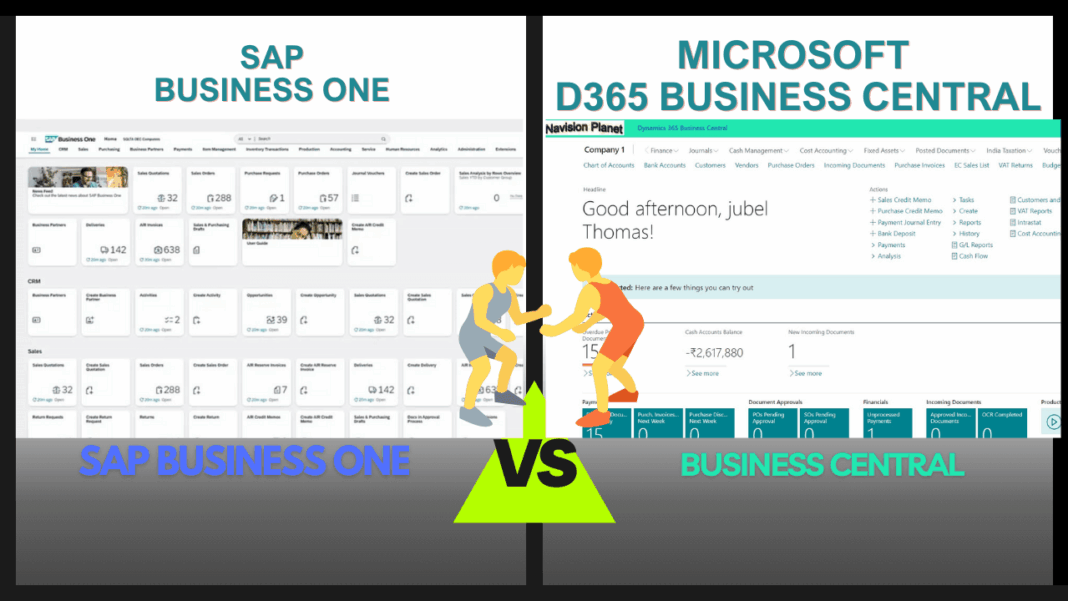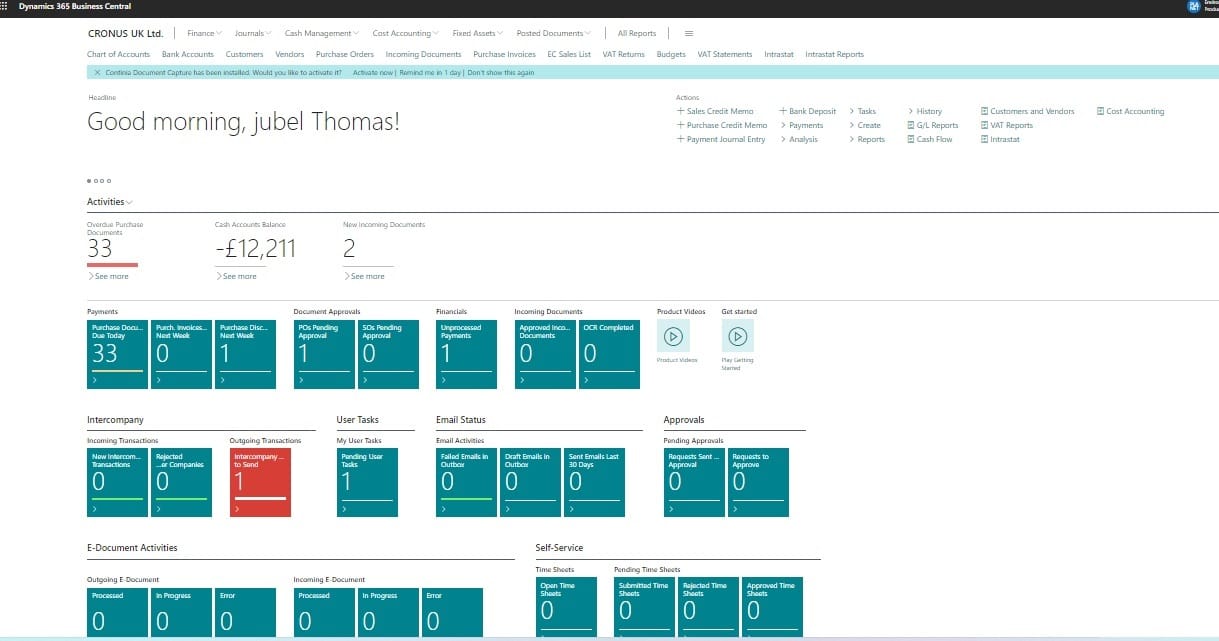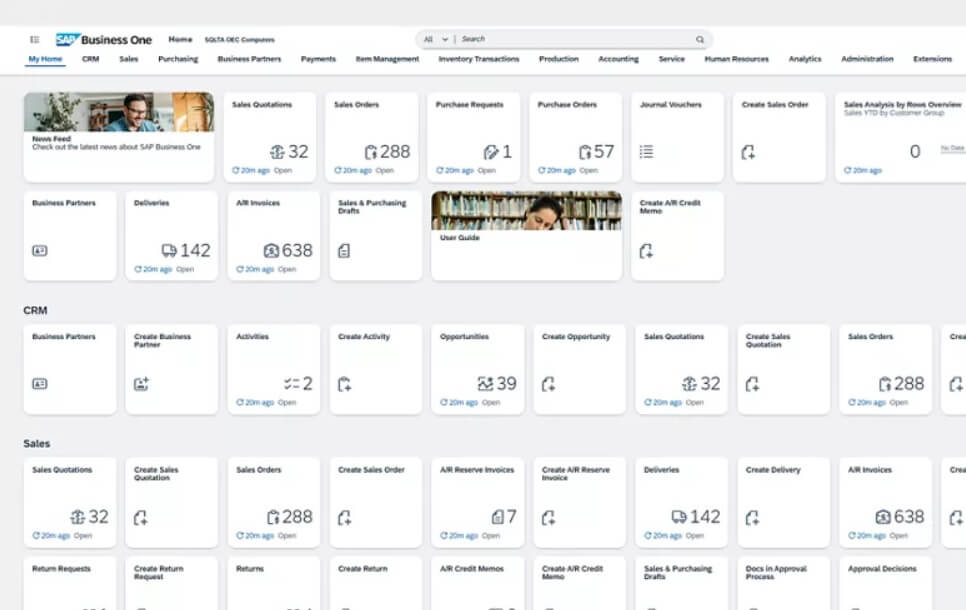When a business outgrows spreadsheets and basic accounting tools, two names often come up in the ERP discussion – Microsoft Dynamics 365 Business Central and SAP Business One. Both are powerful mid-market ERP solutions, but they’re not identical twins. Each has its strengths, limitations, and sweet spots.
Table of Contents
Business Central vs SAP Business One – Functional Comparison
Following table shows quick comparison between D365 Business Central and SAP Business One ERP solutions.
Comparison | Business Central | SAP Business One |
Preview | ||
Deployment | Cloud-first, hybrid support | Mostly on-premise, limited cloud |
Financial Management | Advanced, global ready | Solid basics, add-ons needed |
Supply Chain & Inventory | Advanced WMS & forecasting | Good basics, limited depth |
Sales & CRM | Built-in CRM + Microsoft Sales integration | Basic CRM, often needs external tools |
Reporting & Analytics | Power BI, customizable dashboards | Crystal Reports, less flexible |
Ecosystem & Integrations | Deep Microsoft stack (Excel, Teams, Power Apps) | SAP integrations, fewer 3rd-party apps |
Pricing Model | Subscription, flexible scaling | License based, higher upfront cost |
Scalability | Enterprise ready, global expansion | Suited for SMBs, limited scaling |
Let us walk through a practical comparison in detail so you can see where each fits.
1. Deployment & Flexibility
Business Central: Cloud first but also available on- premise. It easily scales as your company grows, integrates seamlessly with Microsoft 365 (Excel, Teams, Outlook), and supports hybrid setups.
SAP Business One: Traditionally on- premise but also available on SAP’s cloud partners. It’s solid for smaller companies but doesn’t have the same level of flexibility for global expansion.
Tip: If your team already lives inside Microsoft’s ecosystem, Business Central feels like a natural extension.
2. Financial Management
Business Central: Strong in multi company, multi currency, and advanced financial consolidation. Built in reporting and Power BI integration add extra depth.
SAP Business One: Covers core accounting and finance well, including standard reporting. However, complex consolidations or multi- country operations may require add-ons.
For multi entity or international businesses, Business Central edges ahead.
3. Supply Chain & Inventory
Business Central: Offers advanced warehouse management, demand forecasting, production scheduling, and supply planning.
SAP Business One: Good for basic inventory control and purchasing. Manufacturing and advanced planning often require third- party extensions.
4. Sales & CRM
Business Central: Has built in sales cycle management and integrates directly with Dynamics 365 Sales or LinkedIn Sales Navigator for deeper CRM.
SAP Business One: Includes a lightweight CRM module, but many users prefer connecting external CRMs for advanced customer engagement.
5. Reporting & Analytics
Business Central: Native Power BI integration gives real time dashboards and customizable analytics.
SAP Business One: Offers Crystal Reports and dashboards, but customization often requires more technical effort.
6. Ecosystem & Integrations
Business Central: Leverages Microsoft’s huge ecosystem Teams, Outlook, Excel, Power Apps, and a growing AppSource marketplace.
SAP Business One: Integrates with SAP’s ecosystem, but options are narrower compared to Microsoft’s app library.
7. Pricing & Scalability
Business Central: Subscription based (per user/month). Scales well for small to mid sized businesses aiming for long term growth.
SAP Business One: License based (plus annual maintenance). Works well for smaller companies with stable operations.
Choose Business Central if: you need scalability, global finance capabilities, and tight integration with Microsoft apps.
Choose SAP Business One if: you are a smaller company that wants a straightforward ERP with strong accounting and doesn’t plan to expand across multiple geographies soon.
In short, Business Central is like a growth partner, while SAP Business One is a steady starter.
FAQ : BC vs SAP One ERP
Following are top FAQ related to BC vs SAP One ERP
Business Central is cloud-first with advanced scalability, while SAP Business One is mostly on-premise and best for smaller businesses.
SAP Business One has higher upfront costs with licenses. Business Central follows a subscription model, making it more flexible for growing businesses.
Yes. Business Central integrates deeply with Microsoft tools like Excel, Teams, Outlook, Power BI, and Power Apps. SAP B1 integrates mostly within SAP’s own ecosystem.
For very small companies, SAP Business One works well. For growing SMEs and enterprises planning global expansion, Business Central is the stronger choice.






